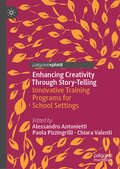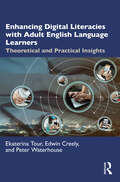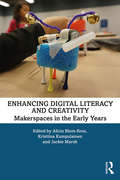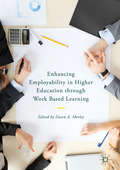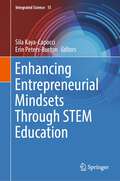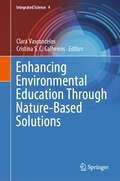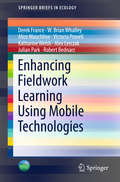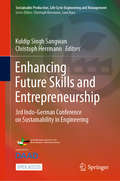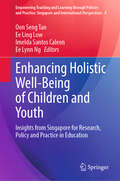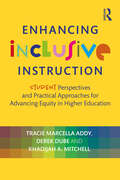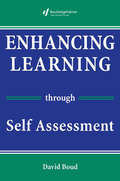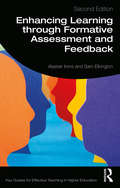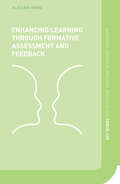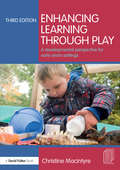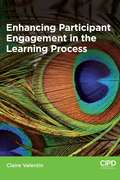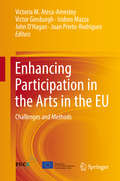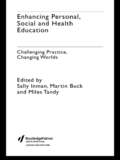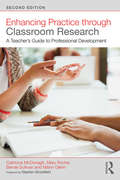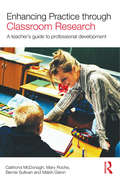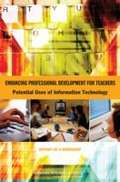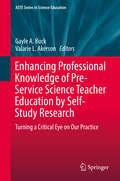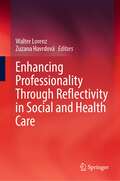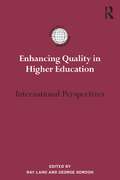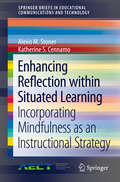- Table View
- List View
Enhancing Creativity Through Story-Telling: Innovative Training Programs for School Settings (Palgrave Studies in Creativity and Culture)
by Alessandro Antonietti Paola Pizzingrilli Chiara ValentiThis book examines the evidence-based interventions that can be used to promote creative thinking skills for children and adolescents in schools. It begins by explaining the theoretical basis of these training programmes, before presenting a coherent framework for the application of creativity theory in education. The authors describe and analyse programmes that have drawn on this framework, before offering an overview of the results of experimental studies which have validated the authors’ approach. This book provides practical guidance on how the programmes can be applied in the classroom and discusses potential future directions for research and practice for increasing children’s creativity. This book will be a valuable resource for teachers and teacher trainers, as well as to researchers in the psychology of creativity, education, and educational psychology.
Enhancing Digital Literacies with Adult English Language Learners: Theoretical and Practical Insights
by Peter Waterhouse Edwin Creely Ekaterina TourOffering a new perspective on adult English language education, this book provides theoretical and practical insights into how digital literacies can be included in the learning programmes for newly arrived adults from migrant and refugee backgrounds. Enhancing Digital Literacies with Adult English Language Learners takes readers inside Langfield, an adult community-based English language centre that supports the settlement and learning of this vulnerable group. Drawing on a six-month ethnographic study of Langfield’s work, the book explores the approach to teaching digital literacies and presents a range of perspectives, including those of the adult learners, the teachers, and the organisation’s CEO. The chapters present a holistic view of teaching digital literacies in the adult English language context by exploring: adult learners’ digital literacy practices in everyday life and their learning at Langfield; teachers' beliefs and practices about digital literacies; and the support offered to them through institutional resources, leadership, and professional learning. The book identifies exemplary practices, as well as areas for further development in Langfield’s work and offers a range of implications for practice, policy, and research. Written in a detailed but accessible manner, this book contributes important insights into the strengths and needs of this unique and complex education sector. Addressing an area of uncertainty for many researchers, practitioners, leaders, and policy makers working within community-based learning contexts in Australia and internationally, this book will be an essential resource.
Enhancing Digital Literacy and Creativity: Makerspaces in the Early Years
by Jackie Marsh Kristiina Kumpulainen Alicia Blum-RossEnhancing Digital Literacy and Creativity is an exploration of how young children gain digital literacies in ‘makerspaces.’ The international authors investigate how hands-on experimentation with a variety of materials - from traditional arts and crafts to contemporary digital tools like 3D printers and laser cutters - can aid children in their development of play, creativity and storytelling. From museums to libraries, nursery schools to community centres, this research shows how ‘making’ supports the development of creative skills and introduces concepts to be explored in a variety of environments and contexts. Drawing on examples from around the globe, described by a range of international academics, Enhancing Digital Literacy and Creativity includes chapters on: Virtual reality Museum and library makerspaces Intergenerational making in families Making in schools and nursery settings Assessing learning in makerspaces Links to previous theories Social imagination This book will be a valuable resource for students and researchers in the fields of education and digital literacies; early childhood teacher educators and practitioners; librarians; museum educators; and makerspace staff.
Enhancing Employability in Higher Education through Work Based Learning
by Dawn A. MorleyThis book focuses on a renewed interest in work based learning in higher education. Due to an increased emphasis on employability in the graduate population, supported by wider policy changes, work based learning is becoming an increasingly pressing issue in higher education. The authors detail innovations from a breadth of UK universities, where academics have creatively addressed changes in work based learning structure, pedagogy and support systems. These changes in turn recognise the impact of real-life learning experiences on student progression, on both an academic development and a personally transformative level. Encompassing a wide variety of topics, the examples within the book are supported by theory and carefully detailed practice pedagogy. This valuable edited collection will be of interest to practitioners and scholars of work based learning and higher education, as well as a useful practical guide for academic developers.
Enhancing Entrepreneurial Mindsets Through STEM Education (Integrated Science #15)
by Sila Kaya-Capocci Erin Peters-BurtonEntrepreneurship is defined in different fields with definitions ranging from a specific perspective such as starting a business to a broader perspective such as a process of establishing new social, economic, environmental, institutional, cultural and/or scientific environments. There has been some movement toward entrepreneurship in STEM education through hackathons and makerspaces, but they tend to be limited to informal settings. In higher education, there seems to be a border line between business schools and education departments. This book aims to remove the borders between the Business Schools and the Department of Education and help Business Schools to develop their educational practices further and help Education Departments to develop their knowledge of entrepreneurship from its formal discipline.The purpose of this book is to bring together experts from STEM education and the formal discipline of entrepreneurship to explore the role of STEM in everyday life through an entrepreneurial lens and show how this integration can broaden STEM education practices.
Enhancing Environmental Education Through Nature-Based Solutions (Integrated Science #4)
by Clara Vasconcelos Cristina S. C. CalheirosThis Book presents innovative and state of the art studies developed in Environmental Education in different countries to highlight this theme and promote its implementation all over the world. It will give a scientific perspective of Nature-based solutions to promote environmental education in all citizens and a more educational perspective as to how this approach can be implemented at schools and universities. Not less important is that includes science communication as a key factor for training and disseminating about the environment. The invited authors are recognized experts with excellent work developed in Environmental Education.This contributed volume presents innovative and creative work in the area giving a step forward in the implementation of Environmental Education, namely as a target of 2020 United Nations Agenda for Sustainable Development. The invitation of authors from many different countries allows the creation of a network and subsequently the book will bring concrete ideas as to how to develop operational capacities to bring added values to Environmental Education at an international level.
Enhancing Fieldwork Learning Using Mobile Technologies
by Robert Bednarz Derek France W. Brian Whalley Alice Mauchline Victoria Powell Katharine Welsh Alex Lerczak Julian ParkThis book shows how tablets (and smartphones) using a variety of selected 'apps', can enhance fieldwork and other out-of-classroom activities. The authors review imaginative uses of tablets from their own project and as well as examples from other colleagues. To help readers keep abreast of new technology and innovative ways to use it, the book is supported by a web site and a social media community.
Enhancing Future Skills and Entrepreneurship: 3rd Indo-German Conference on Sustainability in Engineering (Sustainable Production, Life Cycle Engineering and Management)
by Christoph Herrmann Kuldip Singh SangwanThis open access book presents the proceedings of the 3rd Indo-German Conference on Sustainability in Engineering held at Birla Institute of Technology and Science, Pilani, India, on September 16–17, 2019. Intended to foster the synergies between research and education, the conference is one of the joint activities of the BITS Pilani and TU Braunschweig conducted under the auspices of Indo-German Center for Sustainable Manufacturing, established in 2009. The book is divided into three sections: engineering, education and entrepreneurship, covering a range of topics, such as renewable energy forecasting, design & simulation, Industry 4.0, and soft & intelligent sensors for energy efficiency. It also includes case studies on lean and green manufacturing, and life cycle analysis of ceramic products, as well as papers on teaching/learning methods based on the use of learning factories to improve students’problem-solving and personal skills. Moreover, the book discusses high-tech ideas to help the large number of unemployed engineering graduates looking for jobs become tech entrepreneurs. Given its broad scope, it will appeal to academics and industry professionals alike.
Enhancing Holistic Well-Being of Children and Youth: Insights from Singapore for Research, Policy and Practice in Education (Empowering Teaching and Learning through Policies and Practice: Singapore and International Perspectives #4)
by Ee Ling Low Oon Seng Tan Imelda Santos Caleon Ee Lynn NgThis book documents and chronicles current research and initiatives, and growing knowledge base about well-being, in a Singapore context. In Singapore, the well-being of children and youth has been the subject of research and policy efforts. This is reflective of global and national concerns on the care of the young and those at risk of maladaptive outcomes, the nurturing of emotional health and resilience, and development of social and psychological resources. The chapters present a brief yet comprehensive summary of current insights on the well-being of children, adolescents, teachers, parents, and caregivers within the context of Singapore. This book highlights important issues and gaps in research related to the well-being of children and adolescents that are also relevant to the global community. It also provides recommendations for future directions that will be useful to researchers, policymakers, practitioners, parents, and other key stakeholders.
Enhancing Inclusive Instruction: Student Perspectives and Practical Approaches for Advancing Equity in Higher Education
by Tracie Marcella Addy Derek Dube Khadijah A. MitchellEnhancing Inclusive Instruction centers the voices of students of diverse backgrounds to explore how instructors can approach equitable, inclusive teaching. Grounded in student perspectives, this book is a powerful call to action for instructors to listen to the voices of their learners, take steps to measure the impact of their approaches, and meaningfully reflect on their efforts. The authors provide practical tools that instructors can use to obtain ongoing feedback on their inclusive teaching efforts, and supply guidance on difficult and emerging topics such as how instructors from diverse backgrounds can navigate inclusive teaching in academe, as well as the implications of generative artificial intelligence on equity and inclusion. Modeling the importance of continuous growth, Enhancing Inclusive Instruction provides the knowledge and skills to further any college instructor’s inclusive teaching journey.
Enhancing Learning Through Self-assessment
by David BoudSelf-assessment is increasingly used in higher education as a strategy for both student learning and assessment. This book examines the full range of concerns about self-assessment, placing it in the wider context of innovative teaching and learning practices.
Enhancing Learning through Formative Assessment and Feedback (Key Guides for Effective Teaching in Higher Education)
by Sam Elkington Alastair IronsAssessment is a critical aspect of higher education because it has a range of powerful impacts on what staff and students do and how universities operate. Underpinned by relevant theory and practical advice this fully updated new edition takes into account the changing expectation of students in the context of an increasingly complex and shifting higher education environment to promote the role of formative assessment and formative feedback and its impact on shaping the student learning experience. Presented through the lens of contemporary perspectives, empirical evidence, and case studies across a broad range of subject disciplines, this new edition aims to encourage teaching and support staff to focus on the promotion of student learning through designing and embedding high-impact formative assessment processes and activities. Key content covers: the theoretical and philosophical aspects of formative assessment and formative feedback; the learning environment in which students undertake their learning activities, helping teachers develop appropriate formative assessment and provide effective formative feedback; the impact of formative assessment and formative feedback activities have on learning, teaching, and assessment design, as well as on the academic workload of tutors; the contemporary issues and challenges currently driving research into formative assessment; the use of technology in formative assessment and how different tools and technologies allow for the provision of effective and efficient formative feedback; the benefits of understanding how students respond to formative assessment and formative feedback as an opportunity to review the effectiveness of the teaching and learning methods and techniques; the integral role of formative assessment and formative feedback plays in postgraduate research settings; and how innovations in formative assessment and feedback inform key developments in large-scale assessment change. Aimed at both experienced and early career practitioners in higher education, this text is ideal reading for educators who wish to see a movement away from a higher education system driven by summative assessment to one where a more holistic approach to education positions learning standards rather than measurement and grades as central to effective assessment and, crucially, to return to a focus on student learners.
Enhancing Learning through Formative Assessment and Feedback (Key Guides for Effective Teaching in Higher Education)
by Alastair IronsThis book is based on the argument that detailed and developmental formative feedback is the single most useful thing teachers can do for students. It helps to clarify the expectations of higher education and assist all students to achieve their potential. This book promotes student learning through formative assessment and feedback, which: enables self-assessment and reflection in learning encourages teacher-student dialogue helps clarify what is good performance provides students with quality information to help improve their learning encourages motivation and self-confidence in students aids the teacher in shaping teaching Underpinned by the relevant theory, the practical advice and examples in this book directly address the issues of how to motivate students to engage in formative assessment effectively and shows teachers how they can provide further useful formative feedback.
Enhancing Learning through Play: A developmental perspective for early years settings
by Christine MacintyreWritten to explain why children need to play and offering practical guidance on how to best support children’s development through play, this fully updated third edition includes a wealth of new information to reflect recent changes in the curriculum and early years qualifications. Featuring new chapters on pretend play and the impact of parenting on child development, the book addresses practitioners key concerns through an accessible Q&A format supported with case studies relating to different play situations. It encourages the reader to challenge their own perceptions about play, exploring why children behave as they do at different stages in their development and showing how play can complement and enhance their social, emotional, perceptual motor and intellectual development. This jargon free, updated edition presents: a clear and detailed explanation of the different kinds of play children engage in as they learn and grow. how children learn through their play in a variety of situations. the subtle but genuine differences between male and female development. the difficulties children may have when they have over or under sensitivity to any specific sense or any problems with movement. the importance of emotional well being in children and how this affects their ability to play. an introduction to senses and brain development. Providing a grounded and gentle introduction to child development, this book brings a deeper understanding of children’s learning through play and is an invaluable resource for students on early years courses and practitioners.
Enhancing Participant Engagement in the Learning Process
by Claire ValentinEnhancing Participant Engagement in the Learning Process is an accessible guide for students studying Learning and Development (L&D), and is the supporting text for the CIPD Level 5 Unit 5PEL. It takes the reader through everything they need to know about participant engagement in the learning process: what we mean by ‘learning’ in L&D, the key stakeholders and their varying expectations and interests, motivation theory and learning engagement, how different contexts affect staff engagement in learning, and the psychology behind the learning process.Packed full of examples and engaging tasks, Enhancing Participant Engagement in the Learning Process will develop your ability to plan, manage and deliver learning that meets the needs of learners and stakeholders, underpinned by relevant psychological theories and research. Essential reading for anyone studying L&D with the CIPD, on an undergraduate or postgraduate course, or those with a broader business interest in participation in the learning process, this is a practical text that will ground you in the theory and enable you to reap the benefits of a successful L&D programme in your organisation.
Enhancing Participation in the Arts in the EU
by Victor Ginsburgh Victoria M. Ateca-Amestoy Isidoro Mazza John O'Hagan Juan Prieto-RodriguezIn this book, cultural participation is analyzed as a substantial aspect of European citizenship, but also as a tool for improving individual and societal wellbeing through educational and inclusive policies. It offers an up-to-date overview of ongoing research on the measurement, analysis and prospects of traditional and new forms of cultural engagement in Europe. It describes and assesses available methods and cultural participation and seeks to determine how and how much the various drivers, policies and barriers matter. This publication is the final output of the work done by the members of the EU project "Assessing effective tools to enhance cultural participation," which brought together social scientists and cultural practitioners in joint projects, conferences and seminars, to reflect on the current situation and the challenges faced by managers of cultural institutions and cultural policy makers. The project was awarded a European Union Grant by the CULTURE 2007-2013 program.
Enhancing Personal, Social and Health Education: Challenging Practice, Changing Worlds (School Concerns Ser.)
by Miles Tandy Martin Buck Sally InmanEnhancing Personal, Social and Health Education offers an accessible and thought-provoking approach to developing effective practice in PSHE. The book uses case study examples to offer insights and reflections that will support practitioners developing work in their own schools. The authors begin by examining the national PSHE framework and guidelines, outlining the essential ingredients of effective practice. Subsequent chapters provide case study examples of PSHE practice in primary and secondary schools and broader whole school initiatives. The book offers many useful ideas for planning and teaching PSHE, but also raises fundamental questions about policy at national and local levels, and the extent to which current guidance is helpful and supportive. It will be essential reading for all teachers committed to nurturing the personal and social development of their students.
Enhancing Practice through Classroom Research: A Teacher's Guide to Professional Development
by Caitriona McDonagh Mary Roche Bernie Sullivan Máirín GlennOffering updated references, questions for reflection, the latest case studies, and current advice relating to data protection and storage, this second edition of Enhancing Practice through Classroom Research provides an accessible introduction to understanding and improving teaching and learning through a process of reflection, research, and action. Divided into five parts, this self-study action research approach emphasises the positive aspects of enhancing practice and reflects how this can lead to higher levels of teacher autonomy and agency. With the addition of a chapter dedicated to the links between action research and well-being, this book provides a step-by-step guide to beginning your own research and covers topics such as: Identifying an area of professional concern or interest Exploration of educational values Developing a better understanding of practice Thinking critically about educational practices Finding a research methodology Drawing on the authors’ new experiences of working with second level, third level, and postgraduate educators, as well as their work designing postgraduate programmes in the field of critical reflection and self-study action research, this friendly guide provides a straightforward approach to classroom research. It is the perfect resource for all student and practising teachers looking for support in classroom research, as well as those wanting to pursue effective professional development or further studies in an area of interest.
Enhancing Practice through Classroom Research: A teacher's guide to professional development
by Caitriona McDonagh Mary Roche Bernie Sullivan Mairin GlennEnhancing Practice through Classroom Research is an accessible introduction to understanding and improving teaching and learning through a process of reflection, research and action. Written by teachers for teachers, it offers a straightforward guide to classroom research and considers issues central to effective professional development. Including questions for reflection and illustrated with case studies and vignettes of the authors’ own experiences of undertaking classroom research, it offers a step-by-step guide to beginning your own research: identifying an area of professional concern or interest articulating your own educational values developing a better understanding of your practice thinking critically about educational practices depicting practice as it is and as it evolves finding a research methodology providing evidence of improved practice developing theory from practice. Acknowledging the busy nature of classroom teaching and focussing on personalising professional development, this friendly, sensible text offers support and guidance for all student and practising teachers interested in research either for your own professional development or to pursue postgraduate studies in your area of interest.
Enhancing Professional Development for Teachers Potential Uses of Information Technology: REPORT OF A WORKSHOP
by National Research Council of the National AcademiesTeachers, like other professionals, need to stay informed about new knowledge and technologies. Yet many express dissatisfaction with the professional development opportunities made available to them in schools and insist that the most effective development programs they have experienced have been self-initiated. Enhancing Professional Development for Teachers explores how the provision of professional development through online media has had a significant influence on the professional lives of an increasing number of teachers. Growing numbers of educators contend that online teacher professional development (OTPD) has the potential to enhance and even transform teachers' effectiveness in their classrooms and over the course of their careers. They also acknowledge that it raises many challenging questions regarding costs, equity, access to technology, quality of materials, and other issues. Enhancing Professional Development for Teachers suggests that teachers be active participants in planning and implementation of any new technologies that enhance professional development. The book recommends that federal and state policy makers take on the responsibility of promoting equal access to technology while the federal government and foundations play an important role by supporting the development, evaluation, and revision of OTPD.
Enhancing Professional Knowledge of Pre-Service Science Teacher Education by Self-Study Research
by Gayle A. A. Buck Valarie L. L. AkersonSelf-study research is making an impact on the field of science education. University researchers employ these methods to improve their instruction, develop as instructors, and ultimately, impact their students' learning. This volume provides an introduction to self-study research in science education, followed by manuscripts of self-studies undertaken by university faculty and those becoming university faculty members in science teacher education. Chapter authors range from those new to the field to established researchers, highlighting the value of self-study research in science teacher education for every career rank. The fifteen self-studies provided in this book support and extend this contemporary work in science teacher education. They, and the subsequent reflections on professional knowledge, are organized into four sections: content courses for preservice teachers, elementary methods courses, secondary methods courses, and preparation of future teacher educators. Respondents from various locations around the globe share their reflections on these sections. A culminating reflection of the findings of these studies is provided at the end of the book that provides an overview of what we have learned from these chapters, as well as a reflection on the role of self-study research in the future of science teacher education.
Enhancing Professional Practice: A Framework for Teaching, 2nd Edition (Professional Development Ser.)
by Charlotte DanielsonThe framework for teaching is a research-based set of components of instruction that are grounded in a constructivist view of learning and teaching. The framework may be used for many purposes, but its full value is realized as the foundation for professional conversations among practitioners as they seek to enhance their skill in the complex task of teaching. The framework may be used as the foundation of a school's or district's recruitment and hiring, mentoring, coaching, professional development, and teacher evaluation processes, thus linking all those activities together and helping teachers become more thoughtful practitioners. <P><P>The actions teachers can take to improve student learning are clearly identified and fall under four domains of teaching responsibility: Planning and Preparation, the School Environment, Instruction, and Professional Responsibilities. Within the domains are 22 components and 76 descriptive elements that further refine our understanding of what teaching is all about. The framework defines four levels of performance--Unsatisfactory, Basic, Proficient, and Distinguished--for each element, providing a valuable tool that all teachers can use. <P><P>This second edition has been revised and updated and also includes frameworks for school specialists, such as school nurses, counselors, library and media specialists, and instructional coaches. Comprehensive, clear, and applicable to teaching across the K-12 spectrum, the framework for teaching described in this book is based on the PRAXIS III: Classroom Performance Assessment criteria developed by Educational Testing Service and is compatible with INTASC standards.
Enhancing Professionality Through Reflectivity in Social and Health Care
by Walter Lorenz Zuzana HavrdováThis book discusses complex motivational conditions and strategies on macro, meso, and micro levels promoting reflectivity in interpersonal professional practice. The increasing demands made on practitioners in social and health services, as illustrated by the COVID-19 pandemic, can lead to great uncertainty over how to find "the right response" to complex expressions of need and how to account for ethical professional decisions in view of prevailing strategies of 'risk reduction' and managerial accounting. Reflectivity has been recognised as being of central importance for guiding practitioners towards situationally differentiated and accountable practice. However, it is a complex process made up not only of different psychological components and their interplay with educational and organisational contexts, but also of multilevel interactions and purely situational conditions that can have positive or negative effects. The individual and team reflectivity can be learned and supported through various educational and managerial opportunities, sensitively guided personal and professional experiences and specific patterns of interaction which are reviewed in the book. Reflective supervision in the workplace plays a pivotal role in enabling individual and team reflective processes. However, there are also social and organisational factors that can hinder the development of individual and team reflectivity. The particular value of this publication is that the authors focus on complex research findings from several consecutive studies and critically review and discuss the conditions for reflectivity from various perspectives and with the background of rich academic literature and research. Their research-derived empirical and analytical insights were submitted to managers and educators, and effective and realistic strategies and methods to enhance different levels of reflectivity in students and practitioners were discussed and are summarised in this volume. Among the topics covered: The significance of reflectivity in professional social and health care in relation to changing socio-political contexts Gender aspects of reflectivity in the social and healthcare field Operationalisation of reflectivity for research by personal, team and organisational scales Cultural and communicational patterns of interaction enabling professional reflective processes Enhancing Professionality Through Reflectivity in Social and Health Care is pertinent reading for professors of professional academic training programmes for social workers, nurses, supervisors, trainers in non-formal learning settings, students, and managers of social and health services with an interest in enhancing organisational cultures.
Enhancing Quality in Higher Education: International perspectives (International Studies in Higher Education)
by George Gordon Ray LandInterest in the quality of higher education provision has been steadily increasing over the last twenty years. This has been driven largely by the international creation of explicit policies and reporting requirements to review, audit and evaluate provision. The interest is associated in many countries with the granting by governments of greater autonomy to higher education institutions. This, crucially, comes bound with increased requirements for accountability in the exercise of such power. Enhancing provision, promoting innovation, cultivating exploration and adopting information-led approaches to practice are at the very heart of higher education. As such quality enhancement comes in many guises and is under constant scrutiny. Enhancing Quality in Higher Education looks critically at recent developments in higher education, taking snapshots of changing practices around the world and analysing the varied theoretical perspectives of quality enhancement that are emerging. The opening section draws upon this theoretical base, whilst the second section contextualises it through the analysis of a diverse range of international case studies. The concluding section considers future prospects for the enhancement agenda in the light of the international pressures facing all systems of higher education in the future. Policy will inevitably be shaped by the historical contexts within which national systems are located. The book draws on a wide range of international case studies, examined by a host of contributing experts. The movement towards quality enhancement can be seen as stimulating action at the grassroots of the academy to self-generate improvement. It is a counter to the prevalent view that change in higher education is essentially about the institutional response to increasing societal pressure and state control and, as such, is a welcome contribution to the literature. This comprehensive volume is essential reading for anyone involved in higher education and educational policy.
Enhancing Reflection within Situated Learning: Incorporating Mindfulness As An Instructional Strategy (Springerbriefs In Educational Communications And Technology Ser.)
by Alexis M. Stoner Katherine S. CennamoThis innovative brief provides guidance on promoting reflection in situated learning by incorporating mindfulness strategies, tapping into a surge of research interest in exploring mindfulness as an instructional strategy associated with positive learning outcomes. It illustrates the benefits of continuous reflection within situated learning and how mindfulness can be incorporated before, during, and after the learning experience to enhance the reflective experience. Critically, the authors present a new conceptual model that synthesizes theories and methods from three different areas of study—mindfulness, situated learning, and reflection— to provide a new perspective and instructional approach that has great potential to positively impact outcomes in situated learning.Among the other topics covered:• Strategies for reflection in situated learning.• Strategies for reflection-in-action in situated learning.• Mindfulness strategies for situated learning.• A conceptual model incorporating mindfulness to enhance reflection.Enhancing Reflection within Situated Learning is an exciting and pioneering resource that offers practical guidance to educators and instructional designers interested in incorporating methods and approaches for integrating mindfulness and reflection across instructional environments.
